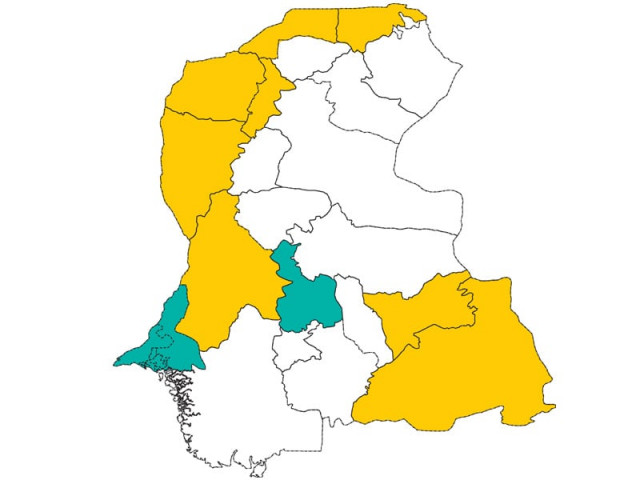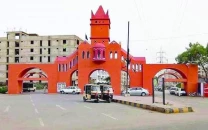Let’s do it commissionery style
Sattar says the commissioner system will “widen the rural-urban divide”.

Let’s do it commissionery style
In a flash, Sindh has been jolted back to the 1990s. The “commissionery” system has been hauled out of the dusty drawers at government offices and has been rebirthed but not without the smear of Qasba blood.
The way the commissionerate system was dragged back out, kicking and screaming, into this world has not been welcomed by many people. Critics call it a vestige of British rule. And indeed, the Pakistan Peoples Party had to figuratively administer it a resounding smack on the bum to resuscitate it.
One of these critics is an important stakeholder, the Muttahida Qaumi Movement (MQM), which has fought changing the way we run our cities, towns and villages under Musharraf’s local governments. The MQM treasures its success under this system as steered by former city nazim Mustafa Kamal - a mayor who waded through Karachi flooded streets with his sleeves rolled up in the kind of demonstrations of hands-on management the city’s residents needed to see.
Aside from the debate on the merits of commissioners versus nazims, the MQM is unhappy with the way this sweeping change was foisted on the system. The MQM’s Dr Farooq Sattar interprets it as yet another move to exert “pressure” on the party to “somehow come back to the table and start talks [to rejoin the Sindh coalition]”. But doesn’t this sound like bad politics – trying to get someone to do what you want by taking away something they like? The MQM left the Pakistan Peoples Party (PPP) in Sindh after the Azad Jammu and Kashmir Legislative Assembly polls were postponed on two seats from Karachi.
Then there are the technical aspects of bringing the old system back. Sattar says the commissioner system will “widen the rural-urban divide”. It also flies in the face of the PPP-supported principle of devolution in which more powers are transferred from Islamabad to Karachi. Additionally, giving magisterial powers to deputy commissioners is in violation of the separation of the judiciary and executive. (A Sindh government official told The Express Tribune, however, that there seems to be little inclination they will give deputy commissioners magisterial powers. “I do not think the judiciary is in the mood to transfer these powers, so this still needs to be decided.”)
The MQM’s opposition to the commissioner system is clear. But even those opposed to Musharraf-era reforms were taken aback by the PPP’s sudden maneuvering to revert to the commissioner system, something they argue goes to another “extreme”. It is being seen as a pressure tactic – not just by the MQM. A former Tharparkar deputy commissioner, Syed Nur Ahmed Shah, also interpreted the move as “a pressure tactic on the MQM”.
The PPP does not agree with the allegation. Senior PPP leader Taj Haider explained that this entire process of switching over was meant to start two years ago. “In the spirit of reconciliation and understanding we wanted the MQM to present any changes,” he said. “But now that they are no longer in the coalition, the PPP is free to present its own bill. The democratic process has been followed and the ordinance will be brought before the Sindh Assembly very soon. We do not want to delay this any further.”
The PPP is still open to the MQM rejoining the coalition. But given the MQM’s opposition to the commissioner system, what does the PPP’s offer mean if they are still going ahead with it? “After a divorce, it is not right to complain,” remarked Haider. “Once we have parted ways, the right course is to leave this behind. We did not want to break off relations with the MQM.”
Aside from the politics
What emerges, aside from perhaps bad timing and execution, is that each system has its merits. Commissioners or nazims, deputy commissioners or DCOs, there is a sliding scale of pros and cons to each system. It is not all black and white. For starters, Taj Haider says that this change isn’t just a ‘commissionerate’ system as has been quoted in newspapers. “There were three separate ordinances, which deal with the local bodies, revenue and police,” he explained. “It is not fair to give this a ‘bureaucratic colour’.” Officials are thus spinning the move as a sign of ‘reform’ and believe that the Sindh government will be strengthened by the commissioner system.
According to one perspective, political control over local government exacerbated by the sidelining of the provincial government has weakened institutions. Two observers, former Sindh chief secretary Kunwar Idris and noted architect and development activist Arif Hasan, both pointed out how politicisation of the local bodies, corruption and a weakened bureaucracy have all been damaging to governance in Sindh as a whole.
Take corruption. The average resident of Karachi is apt to ask, aren’t all bureaucrats, UC councillors, peons, all corrupt? Here too there is a sliding scale of corruption and competence for government officers. Former Tharparkar deputy commissioner Syed Nur Ahmed Shah feels that what is partly to blame is the fact that the “quality of officers” has changed over the years. “Earlier on, the deputy commissioner was someone who could be independent,” he says. “A citizen could rely on [him] to provide relief or effectively solve issues. Now, the political parties – MNAs, MPAs and senators – use [government] officers as their agents. The appointments are done on a political basis. How are they going to work independently? There is also the perception that officers work on ethnic lines, only resolving issues of their own community.”
Arif Hasan is blunt in his assessment. Elected representatives (read LG system) are no better than career bureaucrats (read commissioner system). “It has become a world of contracts and extreme nepotism because political parties control the system of local governance,” he told The Express Tribune.
Corruption is linked to power and how the person running the show wields it – whether a bureaucrat or elected UC nazim. Arif Hasan agrees that the local bodies system had advantages, especially when it comes to how it empowers the most basic administrative unit of the union council. But he astutely points out a kink in the system. The power given to the nazims was “disproportionate as compared to the power of the various agencies that would deliver services. The nazims could override the agencies, which then became weak and subservient to the nazims.”
Money is power. Under local government, the Sindh government became a “nonentity” as it lost control of the purse strings for municipal administrations, explains former Sindh chief secretary Kunwar Idris. “What ended up happening was that the federal government (Centre) would directly give the money to the nazims, and so the provincial government had no fiscal control or knowledge of the money,” he said. The nazim “almost became a dictator”. The city council elected him but had no power to remove them. He was an indirect representative as the city council is made up of elected representatives from the towns and union councils from the local government elections.
With a cashline directly to Islamabad’s coffers, nazims were at an advantage. Ironically this is exactly what Ayub and Musharraf’s local governments set out to accomplish in principle: give the grassroots administrators more power. But Arif Hasan points out that in reality, “The budget allocations go to where the nazim’s clan is based. The cost of development has gone up disproportionately and the nazims hand out favours and contracts.” Small wonder then that the PPP wants an audit of the way the city government spent its money over the last five years.
Accountability is corruption’s nightmare. But it needs to happen for whoever is in office – elected nazim or posted bureaucrat. Therein lies the rub for political economist Haris Gazdar, who is associated with the Collective for Social Science Research. Having a commissioner will do nothing for the state of accountability at the provincial level, because he just replaces the existing administrator or nazim, who is not (directly) elected either.
Gazdar is slightly optimistic. “Things might become marginally better since the commissioner system is at least internally coherent in its assignment of executive authority”.
This view was echoed by Kunwar Idris, who said the new system could work if “they do not tamper with it politically” and allow the bureaucracy to be chosen on merit. “A good bureaucrat will end up doing what is right and fair,” he says. “Even with political pressure, a bureaucrat will try to strike a balance. But a political person will look for the party’s best interests.”
Moving forward?
Gazdar says the biggest challenge is “to rebuild the state at the local level, particularly in rural areas”.
“The Sindh Local Government Ordinance 2001 failed,” he says. “It sapped away any residual life left in rural local administration - by which I do not mean districts but below the district down to the village level. But it did not replace this with any state capacity itself. The challenge remains the same for the revived commissioner system. It might revive some limbs of the old land revenue system but that is outdated and we need something new in its place.”
For now, Arif Hasan says, “the big bureaucracy has won over local politicians, and they are supported by the big political parties. In the long run, we need devolution. With the 18th amendment, the powers have been transferred to the provinces so they need an effective local government to run. What we do not need are these ‘nazims as little gods’ system that the Musharraf government introduced which has in-built, large scale corruption.”
Meanwhile, the PPP and the MQM do not appear to be backing from their positions. However, Sindh minister Zulfiqar Mirza’s meeting with Mohajir Qaumi Movement (Haqiqi) leader Afaq Ahmed, PPP meetings with the Jamaat-e-Islami and the imposition of the new system appear to have shut the door on any negotiations for now. “This seems to be the preparation of a conspiracy against the MQM,” Farooq Sattar told The Express Tribune. “What is going on behind closed doors?”
Even though much has changed in the MQM-PPP relationship since the tense, violent 1990s, the past few days have recalled the fraught era. When asked if this was a throwback to the 1990s, Sattar frighteningly replied, “The situation will go that way.”
HISTORY OF LOCAL GOVERNMENTS
Panchayats:
Panchayats comprised of local elders who would meet the area’s needs and administer justice.
Muslim Period:
From the 8th century onwards, the country would be divided into “sarkars, parganas, towns and dehs”. The deh of the village was headed by a mir Deh, a mir mohallah ran a mohalla (neighbourhood) in a town or a city, and the city was run by a kotwal.
Mughal Period:
1526-1857: The local government introduced by early Muslims followed during the Mughal period.
British era:
Local government institutions controlled by the district administration.
1850: Municipal Act passed
1852: Conservancy boards constituted in Punjab, Karachi and Hyderabad
Late 1800s: Cantonment Boards act legislated in 1864, 1889, 1910 and 1914
1856: Chowkidari Act passed in the rural areas. Panchayats appointed under the act
1861: Police Act passed
1864: 35 municipal committees constituted in Sindh
1867: Land Revenue Act passed
Post-Partition
1953: Village Agricultural and Industrial Development programme to involve rural communities in social and economic development programmes.
General Ayub Khan
1959: The Basic Democracies Set-up was enforced
Zulfikar Ali Bhutto
1971: Basic Democracies Order 1959 and Municipal Administration Ordinance 1960 abolished under Martial Law Order No 24
1972: Local Government Ordinances passed by all provincial governments
General Ziaul Haq
1979: Local Government Ordinances passed by all provincial governments
1979 – 1980: Local bodies elected in four provinces
General Musharraf
2000 – 2001: ‘Devolution of power’ plan implemented, local bodies elections conducted
2002: Police Order passed
Sources:
Local Government Reforms in Pakistan: Context, Content and Causes by Ali Cheema, Asim Ijaz Khwaja and Adnan Qadir - http://www.hks.harvard.edu/fs/akhwaja/papers/Chapter8.pdf
Local Government in Sindh - Agha Shahabuddin, 2003
Published in The Express Tribune, July 13th, 2011.



















COMMENTS
Comments are moderated and generally will be posted if they are on-topic and not abusive.
For more information, please see our Comments FAQ